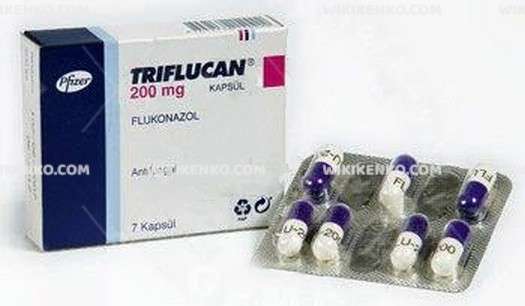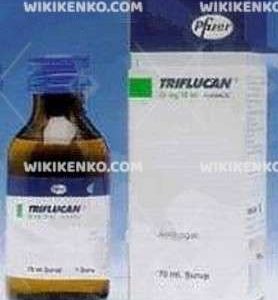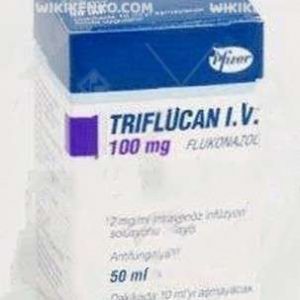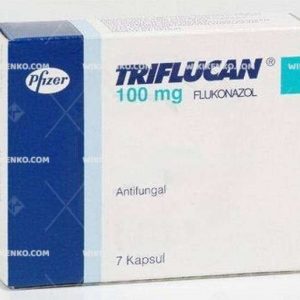Triflucan Capsule 200 Mg (7 Capsule)
We are excited to provide you with a comprehensive overview of Triflucan Capsule 200 Mg, a widely-used antifungal medication. In this article, we’ll delve into the details of this powerful therapeutic agent, exploring its mechanism of action, various applications, dosage recommendations, potential side effects, and safety considerations.
| Dosage form | |
|---|---|
| Pack size | |
| Potency | 200 Mg (7 Capsule) |
| Manufacturer | |
| Origin | |
| Generic Name (Ingredient) | Fluconazole 200 Mg |
Assuming your emergency circumstances for this product, visit Urgent Quotation page. Besides, for any pharmaceutical questions, please ask us in the comments section.
Description
Triflucan, known generically as fluconazole, is an antifungal medication that belongs to the class of azole compounds. It acts as a selective inhibitor of the fungal cytochrome P450-dependent enzyme lanosterol 14-α-demethylase. By interfering with this critical enzyme, Triflucan disrupts the synthesis of ergosterol, an essential component of fungal cell walls.
This alteration leads to increased membrane permeability, impaired uptake of precursor molecules, and ultimately inhibits fungal growth and proliferation.
Triflucan Capsule 200 Mg Mechanism of Action
Triflucan’s mechanism of action is centered around its ability to disrupt the sterol biosynthesis pathway within fungal cells. By inhibiting the lanosterol 14-α-demethylase enzyme, Triflucan effectively interferes with the production of ergosterol, a crucial structural component of fungal cell membranes.
This disruption in cell wall synthesis, growth, and cell adhesion ultimately results in the inhibition of fungal infections and their associated symptoms.
Therapeutic Uses
Triflucan is a versatile antifungal agent, effective against a wide range of fungal infections. Some of the specific conditions it is used to treat include:
Fungal Infections
- Candida albicans
- Candida glabrata (intermediately susceptible strains)
- Candida parapsilosis
- Candida tropicalis
- Cryptococcus neoformans
Specific Conditions
- Fungal corneal ulcers/keratitis
- Candida intertrigo
- Candida pneumonia
- Candida urinary tract infection
- Candidemia
- Esophageal candidiasis
- Coccidioidomycosis
- Oropharyngeal candidiasis
- Systemic Candida infections
- Vaginal candidiasis
- Disseminated candidiasis
Dosage and Administration
The recommended dosage of Triflucan Capsule 200 Mg can vary depending on the specific fungal infection being treated. Here are some general guidelines:
Vaginal Candidiasis
- Uncomplicated Vaginitis: A single oral dose of 150 mg
- Recurrent Vulvovaginal Candidiasis (after induction therapy): 150 mg orally once a week for 6 months
- Complicated Vulvovaginal Candidiasis: 150 mg orally every 72 hours for 3 doses
Oral Thrush (Oropharyngeal Candidiasis)
- Moderate to Severe Oropharyngeal Candidiasis: 100 to 200 mg orally once a day for 7 to 14 days
It’s important to note that individual responses may vary, and it’s crucial to follow your healthcare provider’s specific recommendations regarding the dosage and duration of Triflucan treatment.
Side Effects
Like any medication, Triflucan Capsule 200 Mg may cause both common and rare side effects. While it is generally well-tolerated, it’s essential to be aware of the potential adverse reactions and consult your healthcare provider for personalized advice.
Common Side Effects
- Nausea
- Stomach pain
- Diarrhea
- Upset stomach
- Headache
- Dizziness
- Changes in taste
Rare Side Effects
- Skin rash
- Liver damage
- Heart rhythm changes
If you experience any unusual symptoms or have concerns, it’s crucial to seek immediate medical attention.
Interactions and Precautions
When considering Triflucan Capsule 200 Mg, it’s essential to be aware of potential drug interactions and take appropriate precautions.
Drug Interactions
Triflucan may interact with a variety of medications, including:
- Alprazolam (Xanax)
- Montelukast (Singulair)
- Diphenhydramine (Benadryl)
- Duloxetine (Cymbalta)
- Pregabalin (Lyrica)
- Acetaminophen (Tylenol)
- Certain antibiotics, antivirals, and medications for blood pressure, heart disease, cholesterol, depression, and diabetes
It’s crucial to inform your healthcare provider about any other medications you are currently taking to ensure safe and effective use of Triflucan.
Pregnancy and Breastfeeding
The safety of Triflucan during pregnancy and breastfeeding should be discussed with a healthcare provider. Personalized guidance is essential to weigh the potential benefits and risks.
Storage and Availability
Triflucan Capsule 200 Mg is available by prescription only and is also known by its generic name, fluconazole. It is widely available in various countries, and its prescription status may vary. Always follow your doctor’s recommendations regarding the use of Triflucan.
Conclusion
Triflucan Capsule 200 Mg is a versatile and effective antifungal medication that plays a crucial role in the treatment of a wide range of fungal infections. By understanding its mechanism of action, therapeutic applications, dosage guidelines, potential side effects, and safety considerations, healthcare professionals and patients can make informed decisions to ensure optimal treatment outcomes.
Remember, it’s essential to consult with a qualified healthcare provider before starting or changing any medication regimen. Individual responses may vary, and personalized advice is crucial for the safe and effective use of Triflucan.
| Information | Details |
|---|---|
| Side Effects | – Nausea – Stomach pain – Diarrhea – Upset stomach – Headache – Dizziness – Changes in taste |
| Dosage | – Vaginal Candidiasis: 150 mg single oral dose, 150 mg once weekly for 6 months, or 150 mg every 72 hours for 3 doses – Oral Thrush: 100-200 mg orally once daily for 7-14 days |
| Benefits | – Effective against a range of fungal infections, including Candida and Cryptococcus – Treats various fungal conditions like corneal ulcers, pneumonia, urinary tract infections, and more |
| Usage | – Prescription-only medication – Available in various countries under the brand name Triflucan or generic name fluconazole |
| Safety | – Potential interactions with other medications, including alprazolam, montelukast, and certain antibiotics – Safety during pregnancy and breastfeeding should be discussed with a healthcare provider |
Use the form below to report an error
Please answer the questions as thoroughly and accurately as possible. Your answers will help us better understand what kind of mistakes happen, why and where they happen, and in the end the purpose is to build a better archive to guide researchers and professionals around the world.
The information on this page is not intended to be a substitute for professional medical advice, diagnosis, or treatment. always seek the advice for your physician or another qualified health provider with any questions you may have regarding a medical condition. Always remember to
- Ask your own doctor for medical advice.
- Names, brands, and dosage may differ between countries.
- When not feeling well, or experiencing side effects always contact your own doctor.
Cyberchondria
The truth is that when we’re sick, or worried about getting sick, the internet won’t help.
According to Wikipedia, cyberchondria is a mental disorder consisting in the desire to independently make a diagnosis based on the symptoms of diseases described on Internet sites.
Why you can't look for symptoms on the Internet
If diagnoses could be made simply from a textbook or an article on a website, we would all be doctors and treat ourselves. Nothing can replace the experience and knowledge of specially trained people. As in any field, in medicine there are unscrupulous specialists, differences of opinion, inaccurate diagnoses and incorrect test results.






Reviews
There are no reviews yet.